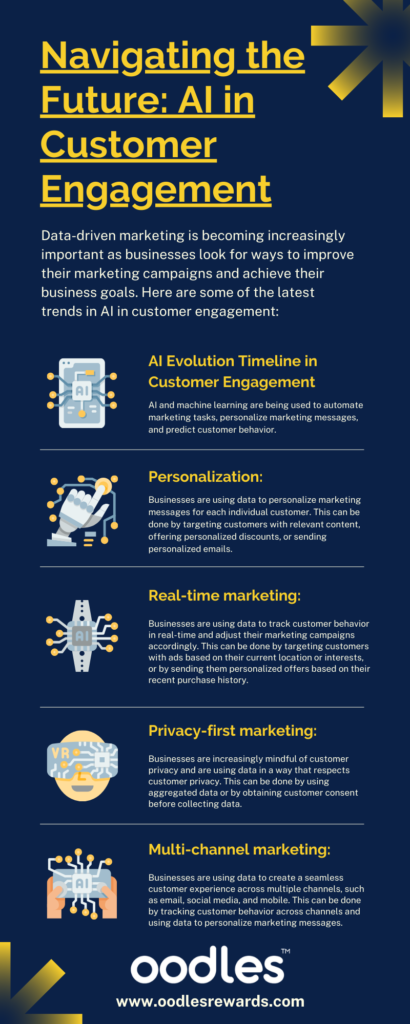
Introduction: In the dynamic world of digital marketing, the concept of customer engagement is undergoing a revolutionary transformation, particularly as we venture into 2024. The catalyst spearheading this transformation is Artificial Intelligence (AI) . This isn’t merely a shift in communication tactics; it’s a strategic evolution toward creating predictive and personalized customer experiences that resonate on a deeper level. AI’s role in this transformation is pivotal, ranging from sophisticated chatbots that understand nuanced human interactions to AI-driven analytics that tailor experiences to individual consumer preferences. In this comprehensive exploration, we’ll delve into the cutting-edge AI strategies and tools that are reshaping the landscape of customer engagement.
Our journey includes an insightful comparison with industry peers like Klaviyo, Tidio, Postscript, and Yotpo, focusing on how their AI solutions stack up and identifying areas where oodles offers unique, innovative perspectives. We aim to highlight the capabilities and creative application of these tools in enhancing customer interactions. Furthermore, we will shed light on oodles’ distinct approach, showcasing how our AI-driven solutions are not just keeping pace but setting new benchmarks in the industry. This exploration will guide businesses looking to leverage AI in customer engagement, offering a glimpse into the future where technology and human insight blend seamlessly to create unparalleled customer experiences.
The Evolution of AI in Customer Engagement
The journey of AI in the sphere of customer engagement is a tale of rapid evolution and innovation. Initially, AI was primarily seen as a tool for automating routine tasks, such as responding to basic customer inquiries or managing data. However, as technology advanced, so did the capabilities of AI, ushering in a new era of customer experience management . Today, AI stands at the forefront of predictive analytics , personalized marketing , and real-time customer interaction .
This evolution is marked by the transition from reactive to proactive engagement. Early AI tools could respond to customer actions, but modern AI often anticipates needs and preferences before the customer articulates them. For instance, AI algorithms now analyze vast amounts of data to predict buying patterns, personalize content, and even identify the optimal timing for engagement. This level of sophistication in AI tools has transformed customer engagement from a one-size-fits-all approach to a highly individualized experience.
Moreover, the integration of AI in customer engagement has also paved the way for enhanced customer insights . By leveraging AI-driven data analysis, businesses can now understand customer behaviors, preferences, and trends more deeply than ever before. This intelligence is crucial in crafting strategies that not only meet but exceed customer expectations, fostering a sense of loyalty and long-term engagement.
As we continue to explore the capabilities of AI in customer engagement, it’s clear that its impact is profound and far-reaching. The technology enhances the efficiency and effectiveness of customer interactions and redefines the very nature of customer relationships in the digital age.

Cutting-Edge AI Tools Reshaping Engagement
In 2024, a diverse array of cutting-edge AI tools is significantly reshaping how businesses engage with their customers. These tools are not just enhancements to existing systems; they are revolutionizing the landscape with innovative functionalities.
Chatbots and Virtual Assistants: Advanced beyond basic query responses, today’s chatbots and virtual assistants are equipped with Natural Language Processing (NLP) and Machine Learning (ML) . This allows them to understand context, manage complex conversations, and provide personalized responses. For instance, an AI assistant can guide a customer through a purchase decision by understanding their preferences and previous interactions.
AI-Powered Recommendation Systems: These systems have become incredibly sophisticated, using customer data to provide tailored recommendations. Unlike earlier versions, which relied on basic purchase history, current AI algorithms can predict customer needs based on a variety of factors like browsing behavior, social media interactions, and even weather patterns.
Real-Time Sentiment Analysis: Tools that analyze customer sentiment in real-time are crucial in today’s market. They can interpret emotions and tones in customer communications, allowing businesses to respond appropriately and timely, enhancing the customer experience.
Predictive Analytics: This tool uses data, statistical algorithms, and ML techniques to identify the likelihood of future outcomes based on historical data. It’s a step ahead in customer service, as it can predict queries or issues customers might face and provide proactive solutions.
Personalized Marketing Automation: AI-driven marketing automation tools have transformed how businesses create and deliver marketing messages. They can now design campaigns that adapt in real-time to customer interactions, ensuring high relevance and engagement.
Each of these tools offers a unique advantage in enhancing customer engagement. By understanding and implementing them effectively, businesses can create a more responsive, personalized, and efficient customer experience, setting themselves apart in a competitive market.

Practical Applications of AI Tools in Various Industries
The practical applications of AI in customer engagement span various industries, each harnessing these tools to address unique challenges and enhance customer experiences.
Retail Industry: In retail, AI-driven personalized shopping experiences are revolutionizing how consumers shop. For instance, AI algorithms analyze past purchases, browsing behaviors, and even social media activity to recommend products that customers are likely to purchase. AI-powered virtual fitting rooms provide a personalized and interactive shopping experience, significantly enhancing customer satisfaction and loyalty.
Healthcare Sector: AI in healthcare has increased patient engagement. AI-powered chatbots provide 24/7 assistance, answering queries, scheduling appointments, and even offering basic medical advice. Predictive analytics play a crucial role in patient care, analyzing patient data to anticipate health issues before they become critical.
Finance and Banking: In the finance sector, AI is used for personalized financial advice , fraud detection, and improving customer service. AI tools analyze spending patterns to offer tailored financial advice, while machine learning algorithms detect unusual activities, enhancing security and trust.
Travel and Hospitality: The travel industry leverages AI for personalized trip planning and efficient customer service. AI chatbots assist with bookings, provide travel recommendations, and offer real-time assistance, making travel planning more convenient and personalized.
E-commerce: AI in e-commerce extends beyond personalized product recommendations. It includes optimizing logistics, predicting stock levels, and providing post-purchase customer support, enhancing the overall shopping experience.
In each of these industries, AI tools are not just a technological upgrade; they are transforming the very nature of customer engagement. By understanding and adopting these AI strategies, businesses can provide exceptional experiences tailored to their customer’s unique needs and preferences, fostering stronger relationships and brand loyalty.

Integrating AI into Your Customer Engagement Strategy
Integrating AI into your customer engagement strategy is a critical step for businesses aiming to stay ahead in the rapidly evolving digital landscape. The key is not just adopting AI technology but doing so in a way that aligns with your business goals and enhances your customer experience.
Start with a Clear Objective: Before diving into AI integration, identify clear objectives. What specific aspects of customer engagement do you want to enhance? Whether improving response times, personalizing customer interactions, or predicting customer needs, having a clear goal will guide your AI strategy.
Choose the Right AI Tools: Not all AI tools are suitable for every business. Selecting tools that align with your business needs and customer expectations is essential. For a retail business, this might mean focusing on AI-powered recommendation engines, while a service-oriented business might benefit more from AI-driven chatbots and customer service tools.
Ensure Data Quality and Privacy: AI tools rely heavily on data, so ensuring high-quality data is crucial. Additionally, maintaining customer privacy and complying with data protection regulations is paramount. Transparent data practices build trust and enhance customer relationships.
Train Your Team : Equip your team with the necessary knowledge and skills to work alongside AI tools. This includes understanding how to interpret AI-generated insights and how to integrate these insights into customer interactions.
Monitor and Iterate: AI integration is not a set-and-forget process. Regularly monitor the performance of AI tools, gather feedback from customers and team members, and make adjustments as needed. Continual refinement is key to ensuring your AI tools remain effective and relevant.
Focus on Human-AI Collaboration: While AI can handle many tasks, the human element remains crucial. Ensure that your strategy allows for seamless collaboration between AI tools and your human team, leveraging both strengths.
By thoughtfully integrating AI into your customer engagement strategy, you can create a more efficient, personalized, and responsive experience for your customers. This not only enhances customer satisfaction but also drives loyalty and business growth.

Overcoming Challenges and Ethical Considerations in AI Implementation
While AI offers immense potential for enhancing customer engagement, its implementation comes with its share of challenges and ethical considerations. Navigating these effectively is crucial for businesses to fully harness AI’s capabilities without compromising on values and customer trust.
Addressing Data Bias and Accuracy: One of the primary challenges in AI implementation is ensuring the accuracy and impartiality of AI algorithms. Biased data can lead to skewed AI decisions, affecting customer experience and potentially leading to reputational damage. Regular audits and updates of AI algorithms and diverse and comprehensive data sets are essential to mitigate this risk.
Ensuring Data Privacy and Security: With AI relying heavily on customer data, safeguarding this information is paramount. Businesses must adhere to strict data privacy regulations and implement robust security measures to protect customer information. Transparent communication about how customer data is used and secured helps in building trust.
Managing Customer Expectations: Managing customer expectations around AI interactions is vital as AI becomes more prevalent. Clear communication about the role of AI in customer service and ensuring a balance between automated and human interactions are key to maintaining a positive customer experience.
Ethical AI Practices: Ethical considerations in AI span from data privacy to the socio-economic impacts of automation. Businesses must consider the broader implications of AI use, ensuring their AI strategies align with ethical standards and contribute positively to the customer and societal well-being.
Technical Integration and Adaptability: Integrating AI into existing systems can be technically challenging. Businesses need to ensure that their infrastructure can support AI tools and that these tools can adapt and scale as the business grows and evolves.
Continuous Learning and Adaptation: AI is not a static solution. It requires continuous learning and adaptation to changing market trends, customer behaviors, and technological advancements. Businesses must remain agile and open to evolving their AI strategies to stay effective.
By proactively addressing these challenges and ethical considerations, businesses can create a responsible and effective AI-driven customer engagement strategy. This enhances customer relationships and positions the business as a forward-thinking and ethical leader in the industry.

The Future Outlook – AI and Beyond in Customer Engagement
As we look toward the future, the role of AI in customer engagement is poised to expand even further, breaking new ground and offering unprecedented opportunities for businesses to connect with their customers.
Emerging AI Technologies: The horizon of AI is ever-expanding, with emerging technologies like emotional AI , which can read and respond to human emotions, and augmented reality (AR) integration , offering immersive customer experiences. These advancements promise to make customer interactions even more personalized and engaging.
Predictive Personalization: AI’s ability to predict customer needs and preferences will become more refined. This will lead to even more personalized customer experiences, where businesses can anticipate customer needs and provide solutions before the customer even realizes the need.
Voice and Conversational AI: The rise of voice search and voice-activated devices is set to redefine customer interactions. AI-powered voice and conversational interfaces will become more prevalent, offering customers a seamless and intuitive way to engage with businesses.
AI in Omnichannel Strategies: AI will play a crucial role in unifying customer experiences across different channels. Whether it’s in-store, online, or through mobile apps, AI will provide a cohesive and consistent brand experience for customers, regardless of the channel.
Ethical AI and Transparency: As AI becomes more integral to customer engagement, the focus on ethical AI practices and transparency will intensify. Businesses will need to be more transparent about their use of AI and ensure that their AI strategies are ethical and customer-centric.
Continuous Innovation and Adaptation: The landscape of AI is continually evolving. Businesses will need to stay agile, continually innovating and adapting their AI strategies to keep pace with technological advancements and changing customer expectations.
The future of customer engagement is inextricably linked with the advancements in AI. Businesses that embrace this technology responsibly and innovatively will be well-placed to forge stronger, more meaningful connections with their customers, setting the stage for long-term success and customer loyalty.
Conclusion
As we navigate through the dynamic landscape of customer engagement in 2024, it’s evident that Artificial Intelligence (AI) is not just a technological tool but a transformative force. The journey we’ve embarked on reveals that AI’s potential to enhance customer interactions is vast and multifaceted. From personalized recommendations to predictive customer service , AI is redefining the boundaries of what’s possible in engaging with customers.
However, the effective implementation of AI is not without its challenges. It requires a thoughtful approach, considering aspects like data privacy , ethical AI practices , and continuous adaptation to technological advancements. The success of AI in customer engagement hinges on how well these challenges are navigated and how ethically the technology is employed.
Looking ahead, the role of AI in customer engagement is only set to grow. Emerging technologies and innovations in AI will open new avenues for creating even more personalized and meaningful customer experiences. The businesses that will thrive in this AI-driven era view AI not as a substitute for human interaction but as a complement to it, enhancing their ability to connect with customers on a deeper level.
At oodles, we understand the transformative power of AI and are committed to leveraging this technology to enhance our customer engagement strategies. Our solutions are designed to integrate seamlessly with your business, ensuring you are equipped to meet the evolving digital world demands. With oodles, you’re not just adopting AI; you’re embracing the future of customer engagement, where technology and human insight combine to create unparalleled customer experiences.

